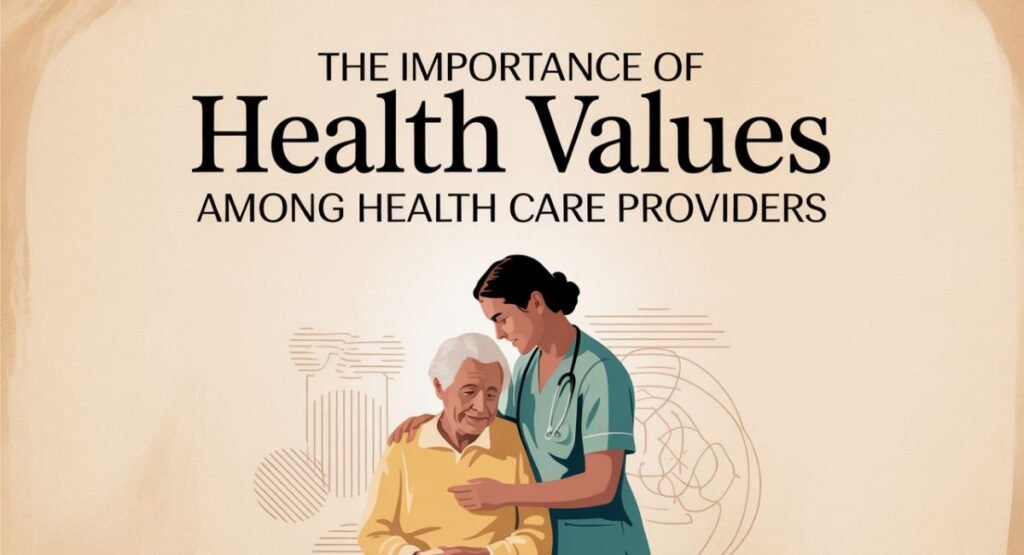Introduction
In today’s rapidly changing healthcare landscape, health values play a crucial role in shaping both patient care and community well-being. These guiding principles influence how healthcare providers interact with patients, make treatment decisions, and promote long-term wellness. By prioritizing quality care, respect, and compassion, health professionals can address diverse patient needs while fostering trust and understanding of the importance of health.
Strong health values not only improve individual health outcomes but also contribute to a healthier society overall. In an era where technology and medical advancements are progressing rapidly, staying grounded in essential health values ensures that healthcare remains patient-centered, ethical, and focused on the holistic needs of every individual.

Understanding Health Values in Modern Healthcare
Health values in the US healthcare system shape how providers care for patients and themselves. They include principles like safe housing, healthy living environment, and access to healthcare services. These values affect public health, patient trust, and the prevention of chronic diseases.
In modern healthcare, values go beyond medical skills. They involve promoting health equity, preventing health inequities, and addressing social determinants of health. For example, a nurse who values home safety and housing quality may notice risks like mold or lead affecting patient outcomes.
Why Good Health Is the Foundation of Quality Care
A provider’s physical environment and mental health directly influence patient outcomes. Studies show providers with strong mental health deliver better care, avoid preventable health conditions, and reduce housing-related health risks in communities.
Healthy providers model nutritious food choices, safe indoor environments, and home maintenance and safety habits for patients. This supports community well-being and reduces socioeconomic disparities in housing and health.
The Role of Physical Activity in Healthcare Professionals’ Well-being
Regular exercise helps healthcare workers avoid heart attacks, control blood pressure, and manage stress. It strengthens resilience when facing infectious diseases or COVID-19 risk.
By valuing physical activity, providers can promote healthy housing design, green building standards, and energy-efficient homes through education. These improve both housing quality and public health in low-income areas.

Valuing a Healthy Diet for Optimal Professional Performance
Good nutrition fuels long shifts and supports mental health condition prevention. A diet rich in whole foods lowers risks of cardiovascular diseases, cancer, and respiratory diseases caused by poor air quality or indoor air pollution.
Providers who eat well inspire patients to address food insecurity and choose safe and affordable housing with proper cooking facilities, reducing housing-related stress and illness.
Mental Health and Emotional Resilience in Care Providers
High stress in US hospitals can cause housing instability, substance use, and poor mental health. Strong emotional resilience helps providers cope and guide patients in improving their own stability and housing choices.
Support programs address social hazards like crime rates, environmental exposure, and overcrowding, which harm community well-being and mental stability.

Key Factors That Influence Health Values in Providers
Workplace quality and safety, leadership culture, and training affect how providers value health. Exposure to housing discrimination or discriminatory housing policy can shape attitudes toward environmental justice and affordable housing development.
Socioeconomic backgrounds matter. Providers from low-income households, Black households, or Hispanic households may have unique insights into low-income housing challenges and government housing assistance.
Health Education as a Tool for Strengthening Provider Values
Public housing initiatives, housing stability programs, and urban planning and health education empower providers to make a bigger impact. Ongoing learning helps address the housing affordability crisis and rent burden and health concerns.
Incorporating housing policy reform into health training encourages providers to see housing quality as a core part of public health interventions.
Impact of Strong Health Values on Patient Outcomes
Providers with strong health values help reduce housing-related health risks, improve neighborhood safety and well-being, and promote affordable housing development. Patients benefit from cleaner indoor environments and fewer biological hazards, chemical hazards, and physical hazards.
Hospitals that integrate healthy housing design principles see fewer COVID-19 complications and infectious diseases, especially in vulnerable groups.

Strategies for Healthcare Organizations to Promote Health Values
Organizations can invest in green building standards, staff wellness programs, and energy-efficient homes for employees. They can also partner with public housing initiatives to address housing instability among patients.
Below is a table showing the connection between housing quality and common health issues in the USA:
| Housing Issue | Potential Health Impact | Prevention Approach |
| Mold | Respiratory diseases, asthma | Improve ventilation |
| Lead | Neurological problems | Lead removal |
| Overcrowding | Infectious diseases, stress | Expand housing |
| Poor Air Quality | Cardiovascular diseases, cancer | Air filters |

Conclusion
The importance of health values among health care providers goes beyond hospital walls. It includes addressing social determinants of health, safe and affordable housing, and housing policy reform.
By promoting health equity, providers help create stronger communities, reduce health inequities, and protect the nation’s public health.



